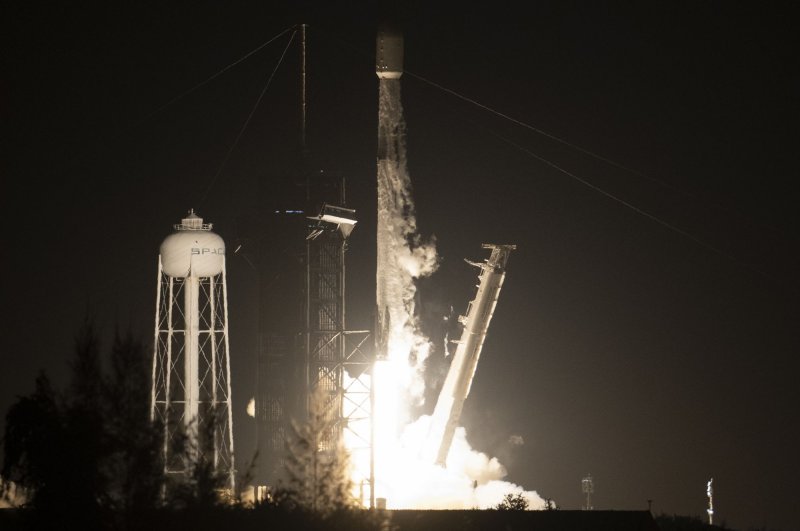1 of 2 | A SpaceX Falcon 9 rocket launches more than 30 first-generation Starlink satellites from Kennedy Space Center in September. The aerospace manufacturing company has been seeking to expand its broadband network around the world. File photo by Joe Marino/UPI |
License Photo
Dec. 2 (UPI) -- SpaceX, the American aerospace manufacturing company owned by billionaire Elon Musk, has received federal approval to launch 7,500 satellites in an operation that would expand the company's Starlink internet services around the world.
Thursday's decision by the Federal Communications Commission, although not everything SpaceX wanted, was seen as a monumental victory for the company as it seeks to grow its broadband network amid increasing competition from major players like DISH and Amazon.
Two years ago, SpaceX asked the government for permission to deploy nearly 30,000 satellites as part of the mission. But the FCC, in its announcement, appeared to be taking a wait-and-see approach by placing limits on the initial rollout.
NASA also raised concerns about collisions and the overall scope of the operation because SpaceX was already approved in 2018 to launch 12,000 of its first-generation satellites.
For now, the FCC deferred "action on the remainder of SpaceX's application" -- indicating that additional deployments could happen at a later time.
A little more than 3,500 of the older model satellites are currently in orbit, providing services to about 500,000 Starlink subscribers as of June.
Starlink has since expanded its product offerings and built up its customer base in sectors such as residential, business, recreational vehicles, boats, and planes.
"Our action will allow SpaceX to begin deployment of Gen 2 Starlink," the agency said in the decree while adding that the slow rollout was intended "to address concerns about orbital debris and space safety."
Musk has touted the ability of the newer satellites to lessen mobile dead zones and provide stronger connectivity from anywhere on Earth as long as the sky is clear.
T-Mobile is likely to become the first American company to feature the Gen 2 network in its devices after announcing a partnership with SpaceX last August.
SpaceX's newly approved second-generation satellites will be deployed in the Starlink internet network constellation that circles the Earth in low orbit amid tons of space junk.
Musk said previously that the newer satellites were a lot bigger than the older model primarily due to the large size of the antenna.
As part of the deal, SpaceX will be required to partner with NASA, the National Science Foundation, and other major satellite service providers to ensure the operation is being run by the book.
SpaceX is also a central partner to NASA's Artemis mission, which will return astronauts to the moon for the first time in 50 years and ultimately pave the way for mankind to reach Mars.















